 Eric Aldea and Ivan Chiossone originally intended Narcophony to be an adaptation of Nurse With Wound's classic 1986 work Spiral Insanafor strings. As the project evolved beyond its original genesis, theydecided instead to create a work that was inspired and suggested by theSteven Stapleton masterwork, rather than a true adaptation. What hasresulted is an album of quiet intensity and true beauty. Spiral Insanastands as Nurse With Wound's most emotionally affecting work; the oneinstance where Stapleton abandoned the clinical distance with which heusually approaches his soundscapes. Narcophony is a similarlyaffecting work; a five-part chamber symphony that envelops the listenerin a spectral wasteland of dread and beauty. Using an ensemble of threeviolins, a viola, a clarinet, a bass and a flute, and Aldea on acousticguitar and "machines," these two artists have created a compellingorchestral work that is all the more amazing for its intense subtlety.The first track places the listener into the moody ambience of a darkforest at night, the distant echoing cries of a sad bird, the pregnanttwilight pushing down on the soul of a lone wanderer. A chorus ofghostly creatures cry out, desperately attempting to push their wayinto cohesion. Their cries fade into the distance. Extinguishedbonfires curl and billow fragrant smoke. The slick surface of wetbranches appear shiny in the moonlight. The forest is a dead museum. Iam reminded of the hauntingly spectral sound design and darksynthscapes that accompanied the night scenes in David Lynch's Twin Peaks: Fire Walk With Me.By the time I reach the third track, I am absolutely transfixed by thisquiet drama; the flutes and synthesizers are sculpting nonsensicalheiroglyphs into my brain. The synthesizer arpeggiations and chirpstake precedence on track four, before being jaggedly torn from the pageand replaced by a series of bubbling electronic swells. After thefive-part song suite of "Petit Buddha," there are two additional songson the disc: "Leo," a lovely ethnic-inflected excursion by IvanChiossone and "Hasmig," another collaboration that highlights Aldea'sguitar and swooping string arrangements. The fragile and sonorous musicmade by Aldea and Chiossone's chamber ensemble is remarkable for itsincredible poise, deep passion and enigmatic resonance. Narcophony is the sound of mystery in motion.
Eric Aldea and Ivan Chiossone originally intended Narcophony to be an adaptation of Nurse With Wound's classic 1986 work Spiral Insanafor strings. As the project evolved beyond its original genesis, theydecided instead to create a work that was inspired and suggested by theSteven Stapleton masterwork, rather than a true adaptation. What hasresulted is an album of quiet intensity and true beauty. Spiral Insanastands as Nurse With Wound's most emotionally affecting work; the oneinstance where Stapleton abandoned the clinical distance with which heusually approaches his soundscapes. Narcophony is a similarlyaffecting work; a five-part chamber symphony that envelops the listenerin a spectral wasteland of dread and beauty. Using an ensemble of threeviolins, a viola, a clarinet, a bass and a flute, and Aldea on acousticguitar and "machines," these two artists have created a compellingorchestral work that is all the more amazing for its intense subtlety.The first track places the listener into the moody ambience of a darkforest at night, the distant echoing cries of a sad bird, the pregnanttwilight pushing down on the soul of a lone wanderer. A chorus ofghostly creatures cry out, desperately attempting to push their wayinto cohesion. Their cries fade into the distance. Extinguishedbonfires curl and billow fragrant smoke. The slick surface of wetbranches appear shiny in the moonlight. The forest is a dead museum. Iam reminded of the hauntingly spectral sound design and darksynthscapes that accompanied the night scenes in David Lynch's Twin Peaks: Fire Walk With Me.By the time I reach the third track, I am absolutely transfixed by thisquiet drama; the flutes and synthesizers are sculpting nonsensicalheiroglyphs into my brain. The synthesizer arpeggiations and chirpstake precedence on track four, before being jaggedly torn from the pageand replaced by a series of bubbling electronic swells. After thefive-part song suite of "Petit Buddha," there are two additional songson the disc: "Leo," a lovely ethnic-inflected excursion by IvanChiossone and "Hasmig," another collaboration that highlights Aldea'sguitar and swooping string arrangements. The fragile and sonorous musicmade by Aldea and Chiossone's chamber ensemble is remarkable for itsincredible poise, deep passion and enigmatic resonance. Narcophony is the sound of mystery in motion. Eric Aldea and Ivan Chiossone originally intended Narcophony to be an adaptation of Nurse With Wound's classic 1986 work Spiral Insanafor strings. As the project evolved beyond its original genesis, theydecided instead to create a work that was inspired and suggested by theSteven Stapleton masterwork, rather than a true adaptation. What hasresulted is an album of quiet intensity and true beauty. Spiral Insanastands as Nurse With Wound's most emotionally affecting work; the oneinstance where Stapleton abandoned the clinical distance with which heusually approaches his soundscapes. Narcophony is a similarlyaffecting work; a five-part chamber symphony that envelops the listenerin a spectral wasteland of dread and beauty. Using an ensemble of threeviolins, a viola, a clarinet, a bass and a flute, and Aldea on acousticguitar and "machines," these two artists have created a compellingorchestral work that is all the more amazing for its intense subtlety.The first track places the listener into the moody ambience of a darkforest at night, the distant echoing cries of a sad bird, the pregnanttwilight pushing down on the soul of a lone wanderer. A chorus ofghostly creatures cry out, desperately attempting to push their wayinto cohesion. Their cries fade into the distance. Extinguishedbonfires curl and billow fragrant smoke. The slick surface of wetbranches appear shiny in the moonlight. The forest is a dead museum. Iam reminded of the hauntingly spectral sound design and darksynthscapes that accompanied the night scenes in David Lynch's Twin Peaks: Fire Walk With Me.By the time I reach the third track, I am absolutely transfixed by thisquiet drama; the flutes and synthesizers are sculpting nonsensicalheiroglyphs into my brain. The synthesizer arpeggiations and chirpstake precedence on track four, before being jaggedly torn from the pageand replaced by a series of bubbling electronic swells. After thefive-part song suite of "Petit Buddha," there are two additional songson the disc: "Leo," a lovely ethnic-inflected excursion by IvanChiossone and "Hasmig," another collaboration that highlights Aldea'sguitar and swooping string arrangements. The fragile and sonorous musicmade by Aldea and Chiossone's chamber ensemble is remarkable for itsincredible poise, deep passion and enigmatic resonance. Narcophony is the sound of mystery in motion.
Eric Aldea and Ivan Chiossone originally intended Narcophony to be an adaptation of Nurse With Wound's classic 1986 work Spiral Insanafor strings. As the project evolved beyond its original genesis, theydecided instead to create a work that was inspired and suggested by theSteven Stapleton masterwork, rather than a true adaptation. What hasresulted is an album of quiet intensity and true beauty. Spiral Insanastands as Nurse With Wound's most emotionally affecting work; the oneinstance where Stapleton abandoned the clinical distance with which heusually approaches his soundscapes. Narcophony is a similarlyaffecting work; a five-part chamber symphony that envelops the listenerin a spectral wasteland of dread and beauty. Using an ensemble of threeviolins, a viola, a clarinet, a bass and a flute, and Aldea on acousticguitar and "machines," these two artists have created a compellingorchestral work that is all the more amazing for its intense subtlety.The first track places the listener into the moody ambience of a darkforest at night, the distant echoing cries of a sad bird, the pregnanttwilight pushing down on the soul of a lone wanderer. A chorus ofghostly creatures cry out, desperately attempting to push their wayinto cohesion. Their cries fade into the distance. Extinguishedbonfires curl and billow fragrant smoke. The slick surface of wetbranches appear shiny in the moonlight. The forest is a dead museum. Iam reminded of the hauntingly spectral sound design and darksynthscapes that accompanied the night scenes in David Lynch's Twin Peaks: Fire Walk With Me.By the time I reach the third track, I am absolutely transfixed by thisquiet drama; the flutes and synthesizers are sculpting nonsensicalheiroglyphs into my brain. The synthesizer arpeggiations and chirpstake precedence on track four, before being jaggedly torn from the pageand replaced by a series of bubbling electronic swells. After thefive-part song suite of "Petit Buddha," there are two additional songson the disc: "Leo," a lovely ethnic-inflected excursion by IvanChiossone and "Hasmig," another collaboration that highlights Aldea'sguitar and swooping string arrangements. The fragile and sonorous musicmade by Aldea and Chiossone's chamber ensemble is remarkable for itsincredible poise, deep passion and enigmatic resonance. Narcophony is the sound of mystery in motion.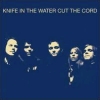 Austin's own Knife in the Water craft an interesting mix of a variety of musical styles into haunting, purposeful dirges that can scourge the light into non-existence. One of the first signings to the new Aspyr label — an off-shoot of the popular software company — the band is re-releasing all their previous recordings along with this album of new material. This is not the same music that was voted into Spin's Top 20 of 2000, but it is the same band all grown up and grown into their relationship.
Austin's own Knife in the Water craft an interesting mix of a variety of musical styles into haunting, purposeful dirges that can scourge the light into non-existence. One of the first signings to the new Aspyr label — an off-shoot of the popular software company — the band is re-releasing all their previous recordings along with this album of new material. This is not the same music that was voted into Spin's Top 20 of 2000, but it is the same band all grown up and grown into their relationship.
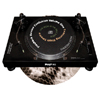 I had to suppress my hatred of shape-CDs and my distaste for artistswho name themselves mockingly after other artists in order to give thisdisc its proper due. I had expected another insubstantialpost-Pluderphonics parody fest. Instead I got one very substantialnoise piece that, at 20 minutes, never wears out its welcome and evenbears repeating. Playback Device is turntable music recorded live atMego hangout Bar Rhiz this February. The most prominent sounds in thepiece are distorted or already painfully noisy records in the processof deceleration, spaced by heavily cut-up and layered human screams. Tothis intimidating background, Empire adds bits of laughing, childrentalking, punk-ish German singing, creaking door sounds, and hummingmotor noise. Submerged breakbeats, death metal guitar, and ten secondsof bouncy dub all enter the mix. Empire is on his toes for theduration, constantly throwing new records into the mix and bringing themass to precarious stops. Though the piece never gets boring and ismore likely to send the listener into his or her own screaming fit, itdoes have a few highpoints. The first is the rather enlightening momentwhen one voice (perhaps Empire's own) rises above the fray to yell"Fuck You" a dozen times, and the second is the track's closingsection. At around 19 minutes the noise drops out, replaced by atwisted, naïvely-styled ditty with a vocalist intent on communicatinghow happy his life was until his mommy and daddy were murdered inAuschwitz. Playback Deviceends with this singer, whose gruff voice sounds live from behind thedecks, screaming "Nazis!" repeatedly. And I thought it was going to befunny! All things considered, this disc is still more pleasant thansome Mego fair, and certainly less intellectual, a good thing (justthis once).
I had to suppress my hatred of shape-CDs and my distaste for artistswho name themselves mockingly after other artists in order to give thisdisc its proper due. I had expected another insubstantialpost-Pluderphonics parody fest. Instead I got one very substantialnoise piece that, at 20 minutes, never wears out its welcome and evenbears repeating. Playback Device is turntable music recorded live atMego hangout Bar Rhiz this February. The most prominent sounds in thepiece are distorted or already painfully noisy records in the processof deceleration, spaced by heavily cut-up and layered human screams. Tothis intimidating background, Empire adds bits of laughing, childrentalking, punk-ish German singing, creaking door sounds, and hummingmotor noise. Submerged breakbeats, death metal guitar, and ten secondsof bouncy dub all enter the mix. Empire is on his toes for theduration, constantly throwing new records into the mix and bringing themass to precarious stops. Though the piece never gets boring and ismore likely to send the listener into his or her own screaming fit, itdoes have a few highpoints. The first is the rather enlightening momentwhen one voice (perhaps Empire's own) rises above the fray to yell"Fuck You" a dozen times, and the second is the track's closingsection. At around 19 minutes the noise drops out, replaced by atwisted, naïvely-styled ditty with a vocalist intent on communicatinghow happy his life was until his mommy and daddy were murdered inAuschwitz. Playback Deviceends with this singer, whose gruff voice sounds live from behind thedecks, screaming "Nazis!" repeatedly. And I thought it was going to befunny! All things considered, this disc is still more pleasant thansome Mego fair, and certainly less intellectual, a good thing (justthis once). 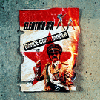 The Electric Six are most definitely a singles band. Admit it, as muchas you pretend to hate their trashy, sleazy hard rock disco, "Danger!High Voltage" got your ears perking and ass moving. So the LP wasn'tspectacular, but hey, you try keeping up the amphetamine laced worshipof fire, dancing, and the night for over a half hour (Please do notrespond with personal anecdotes of how you did this last solstice). Ifanything, the Dance Commander single will redeem the band to those who found themselves somewhat disappointed in Fire.Though "Dance Commander" is one of the better LP tracks, and anexcellent choice to stand on it's own as a single, it is the other twotracks that truly make an impression. The first is "I Am Detroit," ageographical conversation between said city and other notable locales,inviting them to tango on the dance floor of America. Luckily, theElectric Six is just the band with enough misguided confidence and zealto adopt the personification of an entire city and start makingdemands. It's a rhythm heavy rocker that will please both head boppersand hip shakers alike. The third track is a remix of "Dance Commander"by Soulchild that annihilates the original version. Gone are theoverbearing hard rock guitars, replaced by a jangly, rhythmic staccatostrum and layers of synthesizers. This is the type of music that makesthe Electric Six interesting, relentlessly danceable, musically daring,and totally pulling off their attitude, that seems to amount to "we'reso fucking serious about not being serious." With the new beat, thebest aspects of "Dance Commander" become more apparent, and when singerDick Valentine growls out "I went to the store / to get more / FIRE /to start the war!" it is utterly convincing, and phrased soexcellently. The Electric Six know what they like, and they're veryclear about it. "It would be awesome if we could dance" Who cares ifit's not deep or profound. It would be awesome if we could dance, and this single goes a long way to fulfilling that desire.
The Electric Six are most definitely a singles band. Admit it, as muchas you pretend to hate their trashy, sleazy hard rock disco, "Danger!High Voltage" got your ears perking and ass moving. So the LP wasn'tspectacular, but hey, you try keeping up the amphetamine laced worshipof fire, dancing, and the night for over a half hour (Please do notrespond with personal anecdotes of how you did this last solstice). Ifanything, the Dance Commander single will redeem the band to those who found themselves somewhat disappointed in Fire.Though "Dance Commander" is one of the better LP tracks, and anexcellent choice to stand on it's own as a single, it is the other twotracks that truly make an impression. The first is "I Am Detroit," ageographical conversation between said city and other notable locales,inviting them to tango on the dance floor of America. Luckily, theElectric Six is just the band with enough misguided confidence and zealto adopt the personification of an entire city and start makingdemands. It's a rhythm heavy rocker that will please both head boppersand hip shakers alike. The third track is a remix of "Dance Commander"by Soulchild that annihilates the original version. Gone are theoverbearing hard rock guitars, replaced by a jangly, rhythmic staccatostrum and layers of synthesizers. This is the type of music that makesthe Electric Six interesting, relentlessly danceable, musically daring,and totally pulling off their attitude, that seems to amount to "we'reso fucking serious about not being serious." With the new beat, thebest aspects of "Dance Commander" become more apparent, and when singerDick Valentine growls out "I went to the store / to get more / FIRE /to start the war!" it is utterly convincing, and phrased soexcellently. The Electric Six know what they like, and they're veryclear about it. "It would be awesome if we could dance" Who cares ifit's not deep or profound. It would be awesome if we could dance, and this single goes a long way to fulfilling that desire. A song that can weave itself into your consciousness and stay there hours, days, even weeks after hearing it is a powerful thing, like it or not. However, when it coincides with a song you love, it's cosmic. "Crazy Love" first popped up on the Channel 2 compilation from Output. Since then, the song has honestly been on endless repeat both on my CD player and in my head until I finally caved in to buy the debut album from this one man band. Marc Nguyen Tan must have an affinity for Suicide, Joy Division and early New Order, old school dub, and a few other things I'm having a hard time putting my finger on. The music, like some of my all time favorites, is driven by some mesmerising hooks: simple and direct with hypnotic bass, guitar and synth melodies and repetitious drum machine patterns. They're good enough -not- to be complicated by solo wankery, breakbeats, or anything unnecessary. Tan's voice is pretty damned sexy for a Vietnamese Parisian, as muttered through faint echoes on nearly everything. The disc wastes no time and opens with the aforementioned song I've been craving, and continues on through "Confusion," a tune which sounds like an homage to the better remixes of the 1980s, and a sinfully enjoyable dub tribute "One Night In Tokyo." There are moments where the Movement-era New Order is TOO apparent, as the song "Where" comes way too close to echoing Stephen Morris' drums from "The Him," but it's easily forgivable as Tan takes the music further with songs like "This River," filling in the emptiness colorfully with tinkling piano and dissonant guitars. As a person who wouldn't like to live in regret, I -had- to get this before it's too late as the limited edition has started to become scarce. The first run of the release is accompanied with a DVD of some "short films" of five of the album's tracks. The videos aren't anything groundbreaking or high budget, but it's a pleasurable visual accompaniment and highly recommendable for other labels to seriously start considering.
A song that can weave itself into your consciousness and stay there hours, days, even weeks after hearing it is a powerful thing, like it or not. However, when it coincides with a song you love, it's cosmic. "Crazy Love" first popped up on the Channel 2 compilation from Output. Since then, the song has honestly been on endless repeat both on my CD player and in my head until I finally caved in to buy the debut album from this one man band. Marc Nguyen Tan must have an affinity for Suicide, Joy Division and early New Order, old school dub, and a few other things I'm having a hard time putting my finger on. The music, like some of my all time favorites, is driven by some mesmerising hooks: simple and direct with hypnotic bass, guitar and synth melodies and repetitious drum machine patterns. They're good enough -not- to be complicated by solo wankery, breakbeats, or anything unnecessary. Tan's voice is pretty damned sexy for a Vietnamese Parisian, as muttered through faint echoes on nearly everything. The disc wastes no time and opens with the aforementioned song I've been craving, and continues on through "Confusion," a tune which sounds like an homage to the better remixes of the 1980s, and a sinfully enjoyable dub tribute "One Night In Tokyo." There are moments where the Movement-era New Order is TOO apparent, as the song "Where" comes way too close to echoing Stephen Morris' drums from "The Him," but it's easily forgivable as Tan takes the music further with songs like "This River," filling in the emptiness colorfully with tinkling piano and dissonant guitars. As a person who wouldn't like to live in regret, I -had- to get this before it's too late as the limited edition has started to become scarce. The first run of the release is accompanied with a DVD of some "short films" of five of the album's tracks. The videos aren't anything groundbreaking or high budget, but it's a pleasurable visual accompaniment and highly recommendable for other labels to seriously start considering. 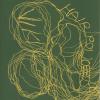 Maybe it's because I heard the song a good ten years after itscreation, but I still have a hard time getting my head around SonicYouth's "Death Valley 69." While I can appreciate the song for what itis, a blasted city-dweller's meditation on the desolate West, and allthe kitsch-laden horror stories coming with it, I've never been able toget as much from the listening experience. All the gratuitous filth andtheatrics just haven't mixed right with a real barrenness alsoprojected by the song. Luckily, there are people in Michigan today whoshoulder this dichotomy with ease. Dearborn's Viki plays afrighteningly arid brand of electro, fattened by an upbringing inAmerica's industrial waist, and packed with enough obtuse humor to keepyour eyes watery without quenching the scorched landscape of the music.She has an eerie, Lydia Lunch-ian delivery, twisting crazed yarns ondating, muscle-car culture, and thin lifestyle advice, over ricketybeats and the squelch of cheap electronics. The result is a more agileversion of the crawling beast conjured by Ann Arbor, Michigan's WolfEyes, with an added resilience to make it all the more menacing. Vikiconvinces me that she lives under the same crumbling off-ramps broughtto life in her songs, while cracking jokes in same breath. No smallfeat…and you can almost dance to it. Kentucky's Hair Police are a tadharder to pin down. On last year's Blow Out Your Bloodthey produced thoroughly abrasive, art-damaged rock, the sounds ofvocals or even drums rarely piercing massive walls of distortion andshattered electronic noise. This release sees them in an even greaterstate of shambles, the bursts of noise and effected screams displacedby longer, more spacious sections of rumbling static and destroyedguttural sounds. Even the song titles, like "Night Visitors" and "NotRaft, But Cage" reveal a more sinister, if less bombastic approach thanprevious efforts, bearing titles like "Do You Love Hop Hop?" and "MagicTool, A Big Hammer." If this is the new Americana, I'm sold.
Maybe it's because I heard the song a good ten years after itscreation, but I still have a hard time getting my head around SonicYouth's "Death Valley 69." While I can appreciate the song for what itis, a blasted city-dweller's meditation on the desolate West, and allthe kitsch-laden horror stories coming with it, I've never been able toget as much from the listening experience. All the gratuitous filth andtheatrics just haven't mixed right with a real barrenness alsoprojected by the song. Luckily, there are people in Michigan today whoshoulder this dichotomy with ease. Dearborn's Viki plays afrighteningly arid brand of electro, fattened by an upbringing inAmerica's industrial waist, and packed with enough obtuse humor to keepyour eyes watery without quenching the scorched landscape of the music.She has an eerie, Lydia Lunch-ian delivery, twisting crazed yarns ondating, muscle-car culture, and thin lifestyle advice, over ricketybeats and the squelch of cheap electronics. The result is a more agileversion of the crawling beast conjured by Ann Arbor, Michigan's WolfEyes, with an added resilience to make it all the more menacing. Vikiconvinces me that she lives under the same crumbling off-ramps broughtto life in her songs, while cracking jokes in same breath. No smallfeat…and you can almost dance to it. Kentucky's Hair Police are a tadharder to pin down. On last year's Blow Out Your Bloodthey produced thoroughly abrasive, art-damaged rock, the sounds ofvocals or even drums rarely piercing massive walls of distortion andshattered electronic noise. This release sees them in an even greaterstate of shambles, the bursts of noise and effected screams displacedby longer, more spacious sections of rumbling static and destroyedguttural sounds. Even the song titles, like "Night Visitors" and "NotRaft, But Cage" reveal a more sinister, if less bombastic approach thanprevious efforts, bearing titles like "Do You Love Hop Hop?" and "MagicTool, A Big Hammer." If this is the new Americana, I'm sold.- Viki - No Date
- Viki - No Work
- Hair Police - Not Raft, But Cage
Crouton
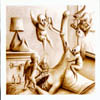 In 1690, John Locke said: "Time is to duration as place is to expansion, and whoever pursues his own thoughts, will find them sometimes launch out beyond the extent of body, into the infinity of space or expansion; the idea whereof is distinct and separate from body and all other things." irr.app.(ext.) says: "Herein, which is the structurelessness of insignificance, possibility is given a reign of manifestation no longer limited by the constraints of possibility, the which can be considered the body."
In 1690, John Locke said: "Time is to duration as place is to expansion, and whoever pursues his own thoughts, will find them sometimes launch out beyond the extent of body, into the infinity of space or expansion; the idea whereof is distinct and separate from body and all other things." irr.app.(ext.) says: "Herein, which is the structurelessness of insignificance, possibility is given a reign of manifestation no longer limited by the constraints of possibility, the which can be considered the body."
What is the way to achieve this structurelessness? This expansion of possibility transcending the body? Why, by subverting your structure into disjecta membra (scattered remains) by the application of Dust Pincher Appliances. The album is the answer to this derationalized notion. The album is a means of achieving voluntary bodily dissolution: the cremation of thought. A series of anti-logical Dada lessons in how to descend the staircase nude without distending your particulars, Dust Pincher Appliances coagulates the diaphanous sounds that emanate, narcotized, from the "antiantedelirationatal music box". Against and before the delirium that logically develops from birth. Cover artwork: Jim Woodring meets Mark Ryden meets Antonin Artaud. A morbidly humorous performance of psychic surgery, the prelude to the Dance of the Tutuguri. Case in point: track four, part b) "bones rattling around oblivion." A shake of the shaman's medicine stick, a juju-needle in your eye, the blood-ooze of the dog star message worming its way around your cerebral cortex. Primal and clinical. Passionate and detached. Track one is vacuumed particles - the Mad Wall-drones that, sucked from your carpet, inhabit your body. Plucked strings inherit your fears, swirling around in a cloud of eraser dust and pencil shavings. Muted and mutable, they are the particulated sounds of dread and debacle being sucked out of the atmosphere and into your vibrating center, so you can no longer hide from irrational devices that whirl and intoxicate.
We are dealing with Irrational Applications of Extreme science. The sound is a bag of sterilized filth, an opportunity for the average human being to display his affection for detritus of the lowest order; a chance communion with all of the scattered effluvia, excretia and aspirated vomit sloughed off in a lifetime of sin. Will you turn away again in disgust, reaching for the toilet plunger, enforcing your corporeal irrelevance? Or will you instead face your foul legacy, and learn to be its equal? Track five: "desist in ceasing to exist," a double negative polarized to repolarize the polar icecaps that strain, crack and break at the influx of echoing underground chambers full of HAARP mindscrapes and digital flushes of modulated brain crimes. A distinctly emotive piece full of hurt and headache. Finally, the culling comes in the form of "wracking the carcass for residue," an industrial throb of obsolescence that entrances as it perplexes. Industrial = IN DUST, a TRIAL = i.e., a baptism achieved through grime. The readymade music boxes of track seven have all the telltale heart of a tale told in part only, and as I slide into this cold wormhole occupied by the hyperstring-membrane, the secret exit tunnel out of a vast abandoned atomsmasher, I know that I must return. I think I lost my contact in there, and out here, I've lost all contact.
 Three years after Dave Pearce released Mirroras Flying Saucer attack, he's now teamed up with Jessica Bailiff toform Clear Horizon. It sounds exactly as I expected a collaborationbetween those two, and I can't imagine anything better. There isn'tmuch indication as to which one of the two initiated the writing on anyof the songs, rather it comes across exactly as what it is: years oftrading tapes of sketches that eventually coalesced into songs. Bailiffdominates the vocal duties, and does a wonderful job. Bathed in reverband echo, just like the surrounding music, she warms the songs intosomething more human than the wintry drones behind her would initiallysuggest. The music is a wonderful throwback to "phase 1" era FlyingSaucer Attack, before he delved more into the beats; simple acousticguitar figures shrouded in white noise and whistling-teapot feedback.It is music completely without edges, enveloping and comforting in asomber sort of way. They only misstep with the closing track, "OpenRoad," driven by a very dated-sounding beat and relatively (veryrelatively) poppy vocals. Though by any other standards a subdued song,it positively roars compared to the rest of the record, and doesn'tplay well with the others. It's easy enough to stop listening before itcomes on though. The rest of Clear Horizon is wonderful enough that you won't want to stop a moment too soon.
Three years after Dave Pearce released Mirroras Flying Saucer attack, he's now teamed up with Jessica Bailiff toform Clear Horizon. It sounds exactly as I expected a collaborationbetween those two, and I can't imagine anything better. There isn'tmuch indication as to which one of the two initiated the writing on anyof the songs, rather it comes across exactly as what it is: years oftrading tapes of sketches that eventually coalesced into songs. Bailiffdominates the vocal duties, and does a wonderful job. Bathed in reverband echo, just like the surrounding music, she warms the songs intosomething more human than the wintry drones behind her would initiallysuggest. The music is a wonderful throwback to "phase 1" era FlyingSaucer Attack, before he delved more into the beats; simple acousticguitar figures shrouded in white noise and whistling-teapot feedback.It is music completely without edges, enveloping and comforting in asomber sort of way. They only misstep with the closing track, "OpenRoad," driven by a very dated-sounding beat and relatively (veryrelatively) poppy vocals. Though by any other standards a subdued song,it positively roars compared to the rest of the record, and doesn'tplay well with the others. It's easy enough to stop listening before itcomes on though. The rest of Clear Horizon is wonderful enough that you won't want to stop a moment too soon.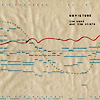 The English city of Bristol is famous for giving birth to such trip-hopluminaries as Massive Attack and Tricky but it is also home to some ofthe best-known space rock bands, most notably Flying Saucer Attack, agroup which over the years has intertwined itself with a number oflocal kindred spirits, such as AMP, Crescent, and Third Eye Foundation.Despite its numerous creative dabblings, FSA has but one ongoingofficial side project: Movietone. Rachel Coe (nee Brook) of FSA startedthe group in 1994, and it currently includes Kate Wright, Matt Jones,John Coe and Sam Jones, along with the assistance of various others on The Sand and the Stars,their fourth full-length album. Since its inception, Movietone hasprogressed further and further in an English folk music direction, butas the band's name suggests, they retain a very cinematic quality,which serves to successfully balance out their overall sound. The titletrack from their latest record is a lovely encapsulation of theiraesthetic. Kate Wright's soft voice comes across as endearingly honest,and is a perfect compliment to the purity of the guitar and piano."Ocean Song" is less minimal, and shows off Movietone's diversity withthe use of banjo, trumpet and tenor saxophone alongside the slowslidings of the guitar, bass and drums. "Pale Tracks" stands as one ofthe best songs on the record because it's a wonderful example of howwell these five musicians really mesh together, both vocally andinstrumentally.
The English city of Bristol is famous for giving birth to such trip-hopluminaries as Massive Attack and Tricky but it is also home to some ofthe best-known space rock bands, most notably Flying Saucer Attack, agroup which over the years has intertwined itself with a number oflocal kindred spirits, such as AMP, Crescent, and Third Eye Foundation.Despite its numerous creative dabblings, FSA has but one ongoingofficial side project: Movietone. Rachel Coe (nee Brook) of FSA startedthe group in 1994, and it currently includes Kate Wright, Matt Jones,John Coe and Sam Jones, along with the assistance of various others on The Sand and the Stars,their fourth full-length album. Since its inception, Movietone hasprogressed further and further in an English folk music direction, butas the band's name suggests, they retain a very cinematic quality,which serves to successfully balance out their overall sound. The titletrack from their latest record is a lovely encapsulation of theiraesthetic. Kate Wright's soft voice comes across as endearingly honest,and is a perfect compliment to the purity of the guitar and piano."Ocean Song" is less minimal, and shows off Movietone's diversity withthe use of banjo, trumpet and tenor saxophone alongside the slowslidings of the guitar, bass and drums. "Pale Tracks" stands as one ofthe best songs on the record because it's a wonderful example of howwell these five musicians really mesh together, both vocally andinstrumentally.In terms of songwriting, The Sand and the Starsseems slightly earthier and simpler than Movietone's previous albums.On the downside, none of the songs are quite as captivatingly beautifulas "Hydra" or "Star Ruby" from their last record, The Blossom Filled Streets.Nevertheless, it's their unfussy approach and cool, breezy musicalbeauty (the album was recorded on a beach, and it shows) thatultimately makes for a very pleasant listening.
 "02/00" starts out with a perverse line of distorted rhythm and melodybefore a brilliant wash of feather-weight synthesizers and piano glideinto position and wash away all sense of perversity. The entire albumfollows suit and the result is as harmonious and complex as it issimple. Each composition is a layered affair; they are equal partsdistortion and clairty and filled to the brim with simple, wistfulmelodies and lighthearted instrumentation. Live instrumentation ismixed with electronic elements in a perfect blend; neither distractsfrom the other and the simplicity of the blend almost completelyeliminates all notions of difference between the two. Sumptuous groovesand vacuous sound effects collide and blend with eachother while moregentle and natural sounds rise above everything like a fine mist. "PassBy" thoughtfully plays out an easy-going piano stroll repeated over andover again above a crunchy (but slick) rhythm section full offuturistic cars passing eachother by at high speed. The mesmerizingeffect the two contrasting parts cannot be emphasized enough: BernhardFleischmann has found a way to make dissonance harmonious. Thoughinaccesible sounds are featured in every song, they never crowd themost attractive features of the album. They're used nimbly and withcaution but they add to each composition in a significant way. Thebusy, work-like commotion of "Until the Real Thing Comes Along" iscontrasted by the guitar and vibraphones that glide over the topnaively. It's as if I'm being carried away from all the stress andfrustration of the working world slowly enough to hear its death fadingaway behind me. All of Welcome Touristis filled with catchy and memorable sounds, but it also features warpedsounds that are just as intriguing. "La Desir" and "Sleep" (twopreviously released songs) are mixed to feature vocals right at the endand surprisingly the addition of lyrics so late in the album works verywell. The second disc is a single 45 minute track featuring Fleischmannon a large variety of instruments and Martin Siewert on a pedal steelguitar. Live drums, piano, leaking noise, funky rhythms, a soulful andnocturnal sax, and resounding guitar drones throw themselves up andagainst eachother only to quiet themselves into simple instrumentalduets, solos, and collages. It's a monument of a performance and italmost steals the show away from the rest of the album. Welcome Tourist puts me in an incredibly good mood everytime I listen to it. -
"02/00" starts out with a perverse line of distorted rhythm and melodybefore a brilliant wash of feather-weight synthesizers and piano glideinto position and wash away all sense of perversity. The entire albumfollows suit and the result is as harmonious and complex as it issimple. Each composition is a layered affair; they are equal partsdistortion and clairty and filled to the brim with simple, wistfulmelodies and lighthearted instrumentation. Live instrumentation ismixed with electronic elements in a perfect blend; neither distractsfrom the other and the simplicity of the blend almost completelyeliminates all notions of difference between the two. Sumptuous groovesand vacuous sound effects collide and blend with eachother while moregentle and natural sounds rise above everything like a fine mist. "PassBy" thoughtfully plays out an easy-going piano stroll repeated over andover again above a crunchy (but slick) rhythm section full offuturistic cars passing eachother by at high speed. The mesmerizingeffect the two contrasting parts cannot be emphasized enough: BernhardFleischmann has found a way to make dissonance harmonious. Thoughinaccesible sounds are featured in every song, they never crowd themost attractive features of the album. They're used nimbly and withcaution but they add to each composition in a significant way. Thebusy, work-like commotion of "Until the Real Thing Comes Along" iscontrasted by the guitar and vibraphones that glide over the topnaively. It's as if I'm being carried away from all the stress andfrustration of the working world slowly enough to hear its death fadingaway behind me. All of Welcome Touristis filled with catchy and memorable sounds, but it also features warpedsounds that are just as intriguing. "La Desir" and "Sleep" (twopreviously released songs) are mixed to feature vocals right at the endand surprisingly the addition of lyrics so late in the album works verywell. The second disc is a single 45 minute track featuring Fleischmannon a large variety of instruments and Martin Siewert on a pedal steelguitar. Live drums, piano, leaking noise, funky rhythms, a soulful andnocturnal sax, and resounding guitar drones throw themselves up andagainst eachother only to quiet themselves into simple instrumentalduets, solos, and collages. It's a monument of a performance and italmost steals the show away from the rest of the album. Welcome Tourist puts me in an incredibly good mood everytime I listen to it. -  Ever since I heard Nuno Canavarro's Plux Qubaalbum, I have been waiting for some artist to approximate the closetedbeauty of that record. Esteemed by Christoph Heemann, Jim O'Rourke andothers since its recording in 1988, Plux Quba is a gem ofbedroom electronica, a fractured, dreamy assemblage of treated vocals,simple electronics and brilliantly restrained melodica. It cannot besimple coincidence that the same label to reissue Plux Quba in1998, O'Rourke's Moikai, is now releasing Orton Socket's debut, a discthat owes much to Canavarro's unique style. Orton Socket is theunlikely project of Ray Mazurek, member of the Chicago Underground Duo,Isotope 317 and others, but that would be hard to guess based on thismusic, a delicate patchwork of digital sounds, lacking definitestructure or even grounding rhythms. 99 Explosions differs from Plux Qubain that, twelve years on, Mazurek has a greater variety of sounds athis disposal, but structurally, it is very similar. The songs enjoy aspare, though non-repetitive structure, with more than one distinctsound rarely occupying the listener. Every piece travels through dozensof individual phrases, each entirely different than its predecessor andarriving in a way that seems both arbitrary, yet in accordance with thedisc's fuzzy logic. Darkly melodic sections appear abruptly butdissolve just as quickly, into low-level hums, shifting glitch effects,and mini, dirge-like drones. Once in a while, rhythms will emerge fromrepeating two-note clusters or metronomic sounds, though they are neverextended, only continued to the point of suggesting furtherdevelopment. Like any great painting, the beauty of 99 Explosionsis the result of its powers of suggestion. In his denial of resolutionor elaboration, Mazurek rends something new from his already beautifulphrases, a unique sound world that exploits listener expectations in anunimposing, delightful way.
Ever since I heard Nuno Canavarro's Plux Qubaalbum, I have been waiting for some artist to approximate the closetedbeauty of that record. Esteemed by Christoph Heemann, Jim O'Rourke andothers since its recording in 1988, Plux Quba is a gem ofbedroom electronica, a fractured, dreamy assemblage of treated vocals,simple electronics and brilliantly restrained melodica. It cannot besimple coincidence that the same label to reissue Plux Quba in1998, O'Rourke's Moikai, is now releasing Orton Socket's debut, a discthat owes much to Canavarro's unique style. Orton Socket is theunlikely project of Ray Mazurek, member of the Chicago Underground Duo,Isotope 317 and others, but that would be hard to guess based on thismusic, a delicate patchwork of digital sounds, lacking definitestructure or even grounding rhythms. 99 Explosions differs from Plux Qubain that, twelve years on, Mazurek has a greater variety of sounds athis disposal, but structurally, it is very similar. The songs enjoy aspare, though non-repetitive structure, with more than one distinctsound rarely occupying the listener. Every piece travels through dozensof individual phrases, each entirely different than its predecessor andarriving in a way that seems both arbitrary, yet in accordance with thedisc's fuzzy logic. Darkly melodic sections appear abruptly butdissolve just as quickly, into low-level hums, shifting glitch effects,and mini, dirge-like drones. Once in a while, rhythms will emerge fromrepeating two-note clusters or metronomic sounds, though they are neverextended, only continued to the point of suggesting furtherdevelopment. Like any great painting, the beauty of 99 Explosionsis the result of its powers of suggestion. In his denial of resolutionor elaboration, Mazurek rends something new from his already beautifulphrases, a unique sound world that exploits listener expectations in anunimposing, delightful way. 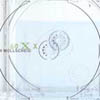 60 x X is the product of a 2002 live broadcast in which Wollscheidengaged every playback device at Frankfurt's Radio X in the continuousplay of pre-recorded music, directing each into his computer and usingthem as sound sources for two hours of live manipulation. At one hour,this disc includes an abbreviated version of the broadcast, dividedinto 60 one-minute sections (hence the title). Upon reading the vagueconcept (something about incorporating new changes in musicbroadcasting and distribution into a "flexible organization of sonicstructures"), and glimpsing the painfully self-referential sleeve art,I braced myself for what was sure to be another inward-looking bore.Too many times I have been seduced by intriguing concepts orexecutions, only to find bland music, incapable of rescue by thecredibility of its origin. Surprisingly, 60 x X is quite the opposite.The piece is downright gripping, progressing in a way that is nevertedious, and Wollscheid's process is more of an afterthought, hardlyindicated by the music. Unlike Philip Jeck and others, Wollscheid isnot interested in looping or layering sound fragments for his newcreations. Any sense of the original material is lost in a shiftinglattice of clicks and cuts that increases in dimension and complexityas the music develops. The sounds of discs skipping occupy theforeground for most of the hour, though they never slip into lullingatmospherics or get lost in too much repetition. Neither is 60 x X ahopeless glitch-fest lacking any structural component. Wollscheidsustains an impressive control throughout, cycling through uniquecall-and-response sections, melancholic passages, and anxious noisebits, while keeping an keen ear turned towards the piece as a whole.From the tiniest of bricks, he has built an elaborate city ofcaptivating spaces, not to go unvisited.
60 x X is the product of a 2002 live broadcast in which Wollscheidengaged every playback device at Frankfurt's Radio X in the continuousplay of pre-recorded music, directing each into his computer and usingthem as sound sources for two hours of live manipulation. At one hour,this disc includes an abbreviated version of the broadcast, dividedinto 60 one-minute sections (hence the title). Upon reading the vagueconcept (something about incorporating new changes in musicbroadcasting and distribution into a "flexible organization of sonicstructures"), and glimpsing the painfully self-referential sleeve art,I braced myself for what was sure to be another inward-looking bore.Too many times I have been seduced by intriguing concepts orexecutions, only to find bland music, incapable of rescue by thecredibility of its origin. Surprisingly, 60 x X is quite the opposite.The piece is downright gripping, progressing in a way that is nevertedious, and Wollscheid's process is more of an afterthought, hardlyindicated by the music. Unlike Philip Jeck and others, Wollscheid isnot interested in looping or layering sound fragments for his newcreations. Any sense of the original material is lost in a shiftinglattice of clicks and cuts that increases in dimension and complexityas the music develops. The sounds of discs skipping occupy theforeground for most of the hour, though they never slip into lullingatmospherics or get lost in too much repetition. Neither is 60 x X ahopeless glitch-fest lacking any structural component. Wollscheidsustains an impressive control throughout, cycling through uniquecall-and-response sections, melancholic passages, and anxious noisebits, while keeping an keen ear turned towards the piece as a whole.From the tiniest of bricks, he has built an elaborate city ofcaptivating spaces, not to go unvisited. Now this is what electronic-tinged folk is supposedto sound like. After all the hype that this sub-genre has received,after countless hit-and-miss or just plain miss releases, let it beknown that Davide Balula gets it right. Pellicule is his debutfull-length and it shows a tremendous gift for melody and mixing it alltogether just so, with no glaring errors or flaws from which pointsshould be deducted. Balula doesn't just write songs: he createsatmospheres for his little organisms to cohabitate or war against eachother or form parasite-host relationships. The emphasis is on the notesthat are played, and what is used to create them is almost incidental.Most tracks do not even feature vocals, and it's of little consequence,as the warm tones and noodling devices still sound like the outpouringof a very genuine heart. When there are words they are in English orFrench, and those on the album's opener are convoluted and random atbest, but then that's kind of the point. This is supposed to be musicthat requires examination before its ultimate purpose is realized.Every time I listened to this record I picked up something I hadn'theard before, and it differed when I was playing it in my car, on myhome stereo, or on my portable with headphones. These are just pure,sweet, guitar-based laments with pulsating beats and processed breaksgalore. At the end of it all, it's a compelling and heartfelt creation,one that is sure to infect anyone who takes it on.
Now this is what electronic-tinged folk is supposedto sound like. After all the hype that this sub-genre has received,after countless hit-and-miss or just plain miss releases, let it beknown that Davide Balula gets it right. Pellicule is his debutfull-length and it shows a tremendous gift for melody and mixing it alltogether just so, with no glaring errors or flaws from which pointsshould be deducted. Balula doesn't just write songs: he createsatmospheres for his little organisms to cohabitate or war against eachother or form parasite-host relationships. The emphasis is on the notesthat are played, and what is used to create them is almost incidental.Most tracks do not even feature vocals, and it's of little consequence,as the warm tones and noodling devices still sound like the outpouringof a very genuine heart. When there are words they are in English orFrench, and those on the album's opener are convoluted and random atbest, but then that's kind of the point. This is supposed to be musicthat requires examination before its ultimate purpose is realized.Every time I listened to this record I picked up something I hadn'theard before, and it differed when I was playing it in my car, on myhome stereo, or on my portable with headphones. These are just pure,sweet, guitar-based laments with pulsating beats and processed breaksgalore. At the end of it all, it's a compelling and heartfelt creation,one that is sure to infect anyone who takes it on.  Jah Wobble has long sought inspiration from afar but here he turns his attention back to his homeland. With local singer Liz Carter and longtime collaborators Jean-Pierre Rasle and Chris Cookson, Wobble re-tools medieval and Victorian era songs in his own image. And that is key for this is a Jah Wobble album through and through despite the subject matter, his tireless dub inspired bass lines underpinning Rasle's pipes, Cookson's guitar and loops and Carter's hearty vocals. Ewan MacColl's "Cannily Cannily" is the lone contemporary song. It bounces along nicely but its words and references are so rooted in history they're lost on me. All of the traditionals are fine but "Banks Of The Sweet Primrose" is the loveliest of the lot as Carter's longing vocal is backed by a haunting pipe drone, gently caressed acoustic guitar and a lulling bass line. "The Unquiet Grave" is a perfect example of the musings on life, love and loss within these songs: "cold blows the wind to my true love and gentle drops the rain / I only had but one true love, in the green wood he lies slain / I'll do as much for my sweetheart as any young maid may / I'll sit and mourn all on his grave for twelve months and one day". It's notable that the four instrumental interludes written by Wobble and Cookson are like-minded but noticeably different. The garish electric guitar squealing in "They Came With A Swagger" detracts from the proceedings but "English Reprise" ("Cannilly" revisited) more than makes up for it with ghostly slide guitar. English Roots Music is another winner from the prolific Wobble, simply one of nine from the past three years by my count.
Jah Wobble has long sought inspiration from afar but here he turns his attention back to his homeland. With local singer Liz Carter and longtime collaborators Jean-Pierre Rasle and Chris Cookson, Wobble re-tools medieval and Victorian era songs in his own image. And that is key for this is a Jah Wobble album through and through despite the subject matter, his tireless dub inspired bass lines underpinning Rasle's pipes, Cookson's guitar and loops and Carter's hearty vocals. Ewan MacColl's "Cannily Cannily" is the lone contemporary song. It bounces along nicely but its words and references are so rooted in history they're lost on me. All of the traditionals are fine but "Banks Of The Sweet Primrose" is the loveliest of the lot as Carter's longing vocal is backed by a haunting pipe drone, gently caressed acoustic guitar and a lulling bass line. "The Unquiet Grave" is a perfect example of the musings on life, love and loss within these songs: "cold blows the wind to my true love and gentle drops the rain / I only had but one true love, in the green wood he lies slain / I'll do as much for my sweetheart as any young maid may / I'll sit and mourn all on his grave for twelve months and one day". It's notable that the four instrumental interludes written by Wobble and Cookson are like-minded but noticeably different. The garish electric guitar squealing in "They Came With A Swagger" detracts from the proceedings but "English Reprise" ("Cannilly" revisited) more than makes up for it with ghostly slide guitar. English Roots Music is another winner from the prolific Wobble, simply one of nine from the past three years by my count. Frenetic electronic music just makes me want to get in the car, step on the gas, and push my poor American-made contrivance to its limit. Damn the pedestrians in my town, damn them to hell, as I slam the right pedal to the floor and turn on the windshield wipers like some crazed Kurgen-like beast with a cackling laugh and no remorse. Then, as I am rudely awakened from my fantasy by my alarm clock, I realize it was just the music that put my brain in this state. It's Tim Perkis' Motive, and it is villain music of the finest caliber.
Frenetic electronic music just makes me want to get in the car, step on the gas, and push my poor American-made contrivance to its limit. Damn the pedestrians in my town, damn them to hell, as I slam the right pedal to the floor and turn on the windshield wipers like some crazed Kurgen-like beast with a cackling laugh and no remorse. Then, as I am rudely awakened from my fantasy by my alarm clock, I realize it was just the music that put my brain in this state. It's Tim Perkis' Motive, and it is villain music of the finest caliber.
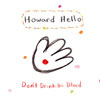 Though it seems easy to write charming and triumphant pop anthems, Howard Hello show how that's just the problem; it seemseasy. Just as playing minimal soundscapes in the style of Tarentel(whose Kenseth Thibideau leads Howard Hello) seems like no more thanholding 2-3 note patterns for ages, attempts I've seen by less skilledpeople prove otherwise. Howard Hello succeed when they work with thetextures and avoid the hooks. On mostly instrumental songs like "FalseHope" and "And as always, Night turns into day," gorgeous analogkeyboard warmth stumbles around sparse song structures and delicatefemale backing vocal textures, creating a playful but melancholy world.The problems arrive when the lead vocals make attempts at anthemic popmusic. For the most part, they don't ironically play on tropes to showhow clever they are, but it's almost more problematic. They write popsongs as if they figured that to make the music different from the moreexperimental fare they're better known for, they need to dumb it down.Instead of focusing on intricacies, they throw down piles of half-bakedhooks that repeat ideas that were tired before they even sang them. Theseeming climax of the album, the six and a half-minute "Way To Go,"brings the problem to a whole other level. I can't decide whichpossibility is worse: did they purposefully try to create a trite"triumphant" singalong in the vein of "Freedom '90" by George Michael,or did they really think what they were doing was interesting on itsown? The completely incongruous-sounding closing track, "Ending," doesa nice job of saving them, clearing the palette with a sweet acousticmelody and wide-eyed vocals, but the pain of the previous song hasalready erased much of the nice things that started the record off.
Though it seems easy to write charming and triumphant pop anthems, Howard Hello show how that's just the problem; it seemseasy. Just as playing minimal soundscapes in the style of Tarentel(whose Kenseth Thibideau leads Howard Hello) seems like no more thanholding 2-3 note patterns for ages, attempts I've seen by less skilledpeople prove otherwise. Howard Hello succeed when they work with thetextures and avoid the hooks. On mostly instrumental songs like "FalseHope" and "And as always, Night turns into day," gorgeous analogkeyboard warmth stumbles around sparse song structures and delicatefemale backing vocal textures, creating a playful but melancholy world.The problems arrive when the lead vocals make attempts at anthemic popmusic. For the most part, they don't ironically play on tropes to showhow clever they are, but it's almost more problematic. They write popsongs as if they figured that to make the music different from the moreexperimental fare they're better known for, they need to dumb it down.Instead of focusing on intricacies, they throw down piles of half-bakedhooks that repeat ideas that were tired before they even sang them. Theseeming climax of the album, the six and a half-minute "Way To Go,"brings the problem to a whole other level. I can't decide whichpossibility is worse: did they purposefully try to create a trite"triumphant" singalong in the vein of "Freedom '90" by George Michael,or did they really think what they were doing was interesting on itsown? The completely incongruous-sounding closing track, "Ending," doesa nice job of saving them, clearing the palette with a sweet acousticmelody and wide-eyed vocals, but the pain of the previous song hasalready erased much of the nice things that started the record off.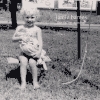 The debut release by this Louisville, KY, musician is cut from a verysimilar grain as the recent works by Jon DeRosa and Nathan Amundson,though with the added twist of a very clever sense of humor. Barnesdoesn't take himself too seriously on these songs even though they areof the most intimate sort, recorded over a year in his bedroom likesome indie-folk Moby. He does wear his influences a bit too proudly onhis sleeve, though, even covering "Anyway..." by Rivulets and thankingthe obvious objects of comparison in the liner notes. I'll forgive thatany day, though, when the work is this full of promise and yetbrilliantly quirky all in the same moment. Barnes plays all theinstruments on Acrobat,which basically amounts to guitar and minimal percussion, but thesimplicity of this music and his vocal presence make it seem like somuch more. The title track is sickeningly sweet but with a morbid edge,as the narrator falls for a girl like an acrobat who plummets from thewire. Barnes sings about her picking up his limbs and putting them backin their sockets before the vultures come and it's still the sweetestsong about love I've heard this year. The songs run the gamut ofemotions and situations, from swerving into oncoming traffic on "GamesWe Play on Road Trips" to unrequited love that turns to murder on "waitFor Her" (incidentally, any folk song that actually uses the word"shiv" soars to the top of my list instantly). Barnes is notnecessarily an innovator, but his debut album is accomplishednonetheless; not too shabby for a 21-year-old college dropout.
The debut release by this Louisville, KY, musician is cut from a verysimilar grain as the recent works by Jon DeRosa and Nathan Amundson,though with the added twist of a very clever sense of humor. Barnesdoesn't take himself too seriously on these songs even though they areof the most intimate sort, recorded over a year in his bedroom likesome indie-folk Moby. He does wear his influences a bit too proudly onhis sleeve, though, even covering "Anyway..." by Rivulets and thankingthe obvious objects of comparison in the liner notes. I'll forgive thatany day, though, when the work is this full of promise and yetbrilliantly quirky all in the same moment. Barnes plays all theinstruments on Acrobat,which basically amounts to guitar and minimal percussion, but thesimplicity of this music and his vocal presence make it seem like somuch more. The title track is sickeningly sweet but with a morbid edge,as the narrator falls for a girl like an acrobat who plummets from thewire. Barnes sings about her picking up his limbs and putting them backin their sockets before the vultures come and it's still the sweetestsong about love I've heard this year. The songs run the gamut ofemotions and situations, from swerving into oncoming traffic on "GamesWe Play on Road Trips" to unrequited love that turns to murder on "waitFor Her" (incidentally, any folk song that actually uses the word"shiv" soars to the top of my list instantly). Barnes is notnecessarily an innovator, but his debut album is accomplishednonetheless; not too shabby for a 21-year-old college dropout. 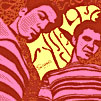 The members of the Love Depression were 17 and 18 years old when theyrecorded this album in their native Venezuela in 1968. They were loversof rock music, and like many teenagers they started a band to paytribute to their idols. Unlike a lot of garage bands that have beenuncovered by a number of compilations, The Love Depression does not domuch to aspire to "lost classic" status. With only one original songthat bows at the temple of Cream and Hendrix, and eleven covers ofvarious hits of the 1960's, The Love Depressionis a strong contender for the least essential release of the year.Their repitoire revolves around the hits of their era (and much ofclassic rock radio today). From "Crossroads," attributed to RobertJohnson in the credits yet clearly more informed by Eric Clapton, to"Stone Free," it's a pretty mundane ride through the jukebox. There aresome surprises, like the appearance of Otis Redding's "Sweet SoulMusic," and some inexplicable choices like Cream's "Toad" complete withextra-long drum solo. It's not exactly up to Ginger Baker standards.Take that however you wish. When singer Jesus "Torito" Toro throwhimself into Procol Harum's "Whiter Shade of Pale," it's difficult tosort through the mixed emotions that the song provokes. On the onehand, there is the disappointment of having to endure the tunelessrendition. On the other hand, I found myself becoming angry. The onlymotivation for releasing this that I can conceive of is so these trackscan be relegated to ironic mix tapes or goofy soundtracks so everyonecan laugh when he pushes through the lyric about "sissteen vestalbirrrrgins" through his thick, Venezuelan accent. Musically, theycapture the song decently, but it's hardly anything special. I don'tknow if it's the sense of earnestness in which they perform "WhiterShade of Pale," or the memory of the original song in my mind, but bythe song really did affect me. Not in a transcendent, revelatory waythat so-called lost classics should, but in a rather gloomy way,skeptical about the potentially sneering motivations and intentionsbehind the release. Their cringe inducing cover of Percy Sledge's "Whena Man Loves a Woman" manages to produce an effect I like to call"sympathetic embarrassment," the feeling you get when you areembarrassed for the performer, but god bless them for getting up thereand trying it. These performances are usually followed by loud, yetuneasy applause. The Love Depression sounds like a moderately talentedcover band whose singer does his best to work around those foreignpronunciations and his unfortunate tendency to bleat and slur thewords. There's something to be said for culling the archives forridiculous, obscure records that serve no other purpose than to amusemodern tastes. Usually they involve singing Christian puppets oroverblown, pretentious "what were they thinking" acts. The LoveDepression seems like a bunch of guys who just wanted to have funplaying their favorite songs, and though they don't exactly stand thetest of time, I don't think they deserve excess ridicule. If youdisagree, I have an old cassette of my high school band doing a musicalversion of T.S. Eliot's "The Love Song of J. Alfred Prufrock" thatsegues into "Born Under a Band Sign" I'd be willing to sell you. Ihonestly hope no one uncovers that in thirty years.
The members of the Love Depression were 17 and 18 years old when theyrecorded this album in their native Venezuela in 1968. They were loversof rock music, and like many teenagers they started a band to paytribute to their idols. Unlike a lot of garage bands that have beenuncovered by a number of compilations, The Love Depression does not domuch to aspire to "lost classic" status. With only one original songthat bows at the temple of Cream and Hendrix, and eleven covers ofvarious hits of the 1960's, The Love Depressionis a strong contender for the least essential release of the year.Their repitoire revolves around the hits of their era (and much ofclassic rock radio today). From "Crossroads," attributed to RobertJohnson in the credits yet clearly more informed by Eric Clapton, to"Stone Free," it's a pretty mundane ride through the jukebox. There aresome surprises, like the appearance of Otis Redding's "Sweet SoulMusic," and some inexplicable choices like Cream's "Toad" complete withextra-long drum solo. It's not exactly up to Ginger Baker standards.Take that however you wish. When singer Jesus "Torito" Toro throwhimself into Procol Harum's "Whiter Shade of Pale," it's difficult tosort through the mixed emotions that the song provokes. On the onehand, there is the disappointment of having to endure the tunelessrendition. On the other hand, I found myself becoming angry. The onlymotivation for releasing this that I can conceive of is so these trackscan be relegated to ironic mix tapes or goofy soundtracks so everyonecan laugh when he pushes through the lyric about "sissteen vestalbirrrrgins" through his thick, Venezuelan accent. Musically, theycapture the song decently, but it's hardly anything special. I don'tknow if it's the sense of earnestness in which they perform "WhiterShade of Pale," or the memory of the original song in my mind, but bythe song really did affect me. Not in a transcendent, revelatory waythat so-called lost classics should, but in a rather gloomy way,skeptical about the potentially sneering motivations and intentionsbehind the release. Their cringe inducing cover of Percy Sledge's "Whena Man Loves a Woman" manages to produce an effect I like to call"sympathetic embarrassment," the feeling you get when you areembarrassed for the performer, but god bless them for getting up thereand trying it. These performances are usually followed by loud, yetuneasy applause. The Love Depression sounds like a moderately talentedcover band whose singer does his best to work around those foreignpronunciations and his unfortunate tendency to bleat and slur thewords. There's something to be said for culling the archives forridiculous, obscure records that serve no other purpose than to amusemodern tastes. Usually they involve singing Christian puppets oroverblown, pretentious "what were they thinking" acts. The LoveDepression seems like a bunch of guys who just wanted to have funplaying their favorite songs, and though they don't exactly stand thetest of time, I don't think they deserve excess ridicule. If youdisagree, I have an old cassette of my high school band doing a musicalversion of T.S. Eliot's "The Love Song of J. Alfred Prufrock" thatsegues into "Born Under a Band Sign" I'd be willing to sell you. Ihonestly hope no one uncovers that in thirty years.  LPD fans are once again rewarded for their patience with the issue of a classic cassette-only release. Traumstadt 1is an important artifact in the history of the Dots and the wait waswell worth it. The original release was the first in a series ofcassette issues that started off by reissuing earlier deletedcassettes. It was later followed up with other live and studiocomilations and even one with all new material. Most of which hassurfaced through various CD compilations like Stained Glass Soma Fountains, Under Triple Moons, The Legendary Pink Box, Prayer for Aradia, and the live CD-Rs released on Terminal Kaleidoscope. This one contains the full releases of both Apparition and Atomic Roses, each which first surfaced in 1982. Much like the release of Basilisk,the remastering job is simply amazing, given the original sources werevery primitive cassette recordings. Additionally, the annoyance ofhaving a multitude of songs sharing a track is present again. Atomic Rosesopens with what was side one of the original tape release. "Part 1" isa collection of six songs, including "Closet Kings," which appeared on The Legendary Pink Box,"Sex," (an alternate version of "Violence," with the words completelydifferent), the charming "What's Next," some playful noodlings andbackwards bits. "Hauptbahnhof," (also appearing on The Legendary Pink Box)opens "Part 2," which also includes "Passing Thought" and two earlyversions of "Atomic Roses." While a number of these songs are familiarto LPD fans, it's an almost voyeuristic treat to hear them in thecontext of their original work without the overbearing hiss thataccompanies the original quiet recordings. One of the remarkableobservations any Dots fans can also make from these recordings is howtight the band actually was at such an early point, with a talentedbass guitarist, Roland Calloway matched with subtle, primitive synths(uncredited to the Silverman - perhaps he wasn't actually on theserecordings), drum machines and Edward Ka-Spel's refrained voice. Apparitionis equally rewarding, but more sounding like cute bedroom demos,opening with cheesy video game samples and cheap Casio-like keyboards.Included in each of the mixes are early versions of "God Speed," "ThePlague," and the only appearance of "Premonition 3." Despite Atomic Roses listing the members including Barry Gray on guitar and Patrick Paganini (Wright) on violin, it isn't until the songs on Appraritionthat the two are prominently heard. It's this combination which laterevolved into the sounds on early LP releases that captivated labelslike Play It Again Sam and overseas licenses from WaxTrax!, Caroline,and eventually Soleilmoon. The disc closes with a bonus track, "NoBell, No Prize (Version Ridiculous)," only previously available on anobscure various artists cassette compilation and surprisinglyappropriate (given the history of LPD reissue) as it's from the sameera as the rest of the material contained. Once again, Beta-Lactam'sfont choice leaves much to be desired, but they did get the artworkfrom original releases, which is nice to see. Truth be told, I'm muchmore a fan of straight up reissues like this than aforementionedcompilations tossed together from various sources which often omitsongs here and there. There's still more stuff left in the vaults fromthe Dots, like Traumstadt 4, Chemical Playschool 1 & 2, and other odds and ends so let's hope this campaign doesn't end here.
LPD fans are once again rewarded for their patience with the issue of a classic cassette-only release. Traumstadt 1is an important artifact in the history of the Dots and the wait waswell worth it. The original release was the first in a series ofcassette issues that started off by reissuing earlier deletedcassettes. It was later followed up with other live and studiocomilations and even one with all new material. Most of which hassurfaced through various CD compilations like Stained Glass Soma Fountains, Under Triple Moons, The Legendary Pink Box, Prayer for Aradia, and the live CD-Rs released on Terminal Kaleidoscope. This one contains the full releases of both Apparition and Atomic Roses, each which first surfaced in 1982. Much like the release of Basilisk,the remastering job is simply amazing, given the original sources werevery primitive cassette recordings. Additionally, the annoyance ofhaving a multitude of songs sharing a track is present again. Atomic Rosesopens with what was side one of the original tape release. "Part 1" isa collection of six songs, including "Closet Kings," which appeared on The Legendary Pink Box,"Sex," (an alternate version of "Violence," with the words completelydifferent), the charming "What's Next," some playful noodlings andbackwards bits. "Hauptbahnhof," (also appearing on The Legendary Pink Box)opens "Part 2," which also includes "Passing Thought" and two earlyversions of "Atomic Roses." While a number of these songs are familiarto LPD fans, it's an almost voyeuristic treat to hear them in thecontext of their original work without the overbearing hiss thataccompanies the original quiet recordings. One of the remarkableobservations any Dots fans can also make from these recordings is howtight the band actually was at such an early point, with a talentedbass guitarist, Roland Calloway matched with subtle, primitive synths(uncredited to the Silverman - perhaps he wasn't actually on theserecordings), drum machines and Edward Ka-Spel's refrained voice. Apparitionis equally rewarding, but more sounding like cute bedroom demos,opening with cheesy video game samples and cheap Casio-like keyboards.Included in each of the mixes are early versions of "God Speed," "ThePlague," and the only appearance of "Premonition 3." Despite Atomic Roses listing the members including Barry Gray on guitar and Patrick Paganini (Wright) on violin, it isn't until the songs on Appraritionthat the two are prominently heard. It's this combination which laterevolved into the sounds on early LP releases that captivated labelslike Play It Again Sam and overseas licenses from WaxTrax!, Caroline,and eventually Soleilmoon. The disc closes with a bonus track, "NoBell, No Prize (Version Ridiculous)," only previously available on anobscure various artists cassette compilation and surprisinglyappropriate (given the history of LPD reissue) as it's from the sameera as the rest of the material contained. Once again, Beta-Lactam'sfont choice leaves much to be desired, but they did get the artworkfrom original releases, which is nice to see. Truth be told, I'm muchmore a fan of straight up reissues like this than aforementionedcompilations tossed together from various sources which often omitsongs here and there. There's still more stuff left in the vaults fromthe Dots, like Traumstadt 4, Chemical Playschool 1 & 2, and other odds and ends so let's hope this campaign doesn't end here.samples:
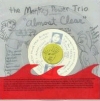 I'd never heard of the Monkey Power Trio before their latest and eighthrelease, and that may not be all that surprising. For the past eightyears, the band has met in a common location to play and record for oneday together. No live shows. No rehearsals. One day together for thepurposes of recording a seven-inch single that they will releasethemselves. They do this without any real knowledge of the instrumentsthey take into their hands even. In what may be the greatest inverse tothe theory that poor concept equals poor output, however, these popgems continue to improve with each release. The MPT honor theiroriginal gimmick fervently, insisting they will hold to it until allthe other members are dead and the sole remaining member records a soloalbum.This stuff is just too bizarre to pass up, even though the melodies andmusicianship are clearly in the amateur category. "I Love My Life" is asimple declaration with lyrics about strolling the streets of Athens,GA, and a crumhorn that won't hurt the beautiful babies, but thenregresses into simple rock chords and screams of the title. "Mike Smithis Evil," on the other hand, is a strange mellow trip into the problemof its namesake, complete with the "evil" vocal delivery and oddsynthesizer. It's juvenile, but all in good fun, and represents thefinest melody the band possesses on the release. Side B is more of thesame, with "Almost Clear" taking a few cues from scientology andexperimentalism to create a dreamlike wash, and "Systematic Problem"dissolving it all in a wash of noise and childlike banter. As it fadesout, it's reminiscent of when the PRMC would play records backward atpress conferences in order to prove satanic messages were within.
I'd never heard of the Monkey Power Trio before their latest and eighthrelease, and that may not be all that surprising. For the past eightyears, the band has met in a common location to play and record for oneday together. No live shows. No rehearsals. One day together for thepurposes of recording a seven-inch single that they will releasethemselves. They do this without any real knowledge of the instrumentsthey take into their hands even. In what may be the greatest inverse tothe theory that poor concept equals poor output, however, these popgems continue to improve with each release. The MPT honor theiroriginal gimmick fervently, insisting they will hold to it until allthe other members are dead and the sole remaining member records a soloalbum.This stuff is just too bizarre to pass up, even though the melodies andmusicianship are clearly in the amateur category. "I Love My Life" is asimple declaration with lyrics about strolling the streets of Athens,GA, and a crumhorn that won't hurt the beautiful babies, but thenregresses into simple rock chords and screams of the title. "Mike Smithis Evil," on the other hand, is a strange mellow trip into the problemof its namesake, complete with the "evil" vocal delivery and oddsynthesizer. It's juvenile, but all in good fun, and represents thefinest melody the band possesses on the release. Side B is more of thesame, with "Almost Clear" taking a few cues from scientology andexperimentalism to create a dreamlike wash, and "Systematic Problem"dissolving it all in a wash of noise and childlike banter. As it fadesout, it's reminiscent of when the PRMC would play records backward atpress conferences in order to prove satanic messages were within.samples:



